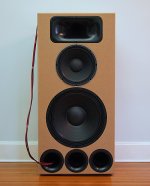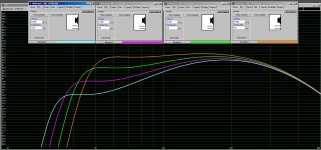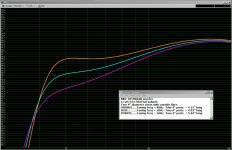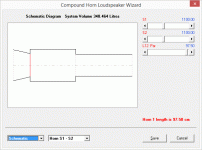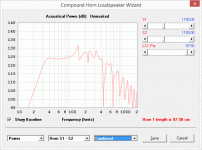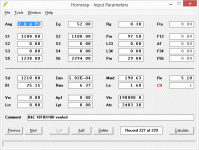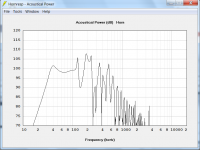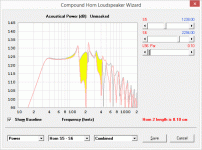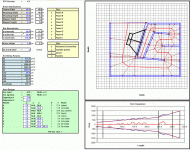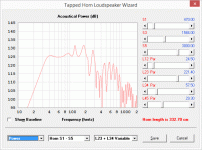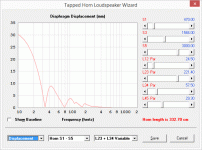Anyone have a good example of a DIY subwoofer design using the B&C 18TBX100 driver? I'm trying to avoid recreating the wheel here...
I'm kind of leaning towards a simple vented box ~180 liters tuned to 34 Hz with a big flared port, but I'm open to other ideas.
I'm kind of leaning towards a simple vented box ~180 liters tuned to 34 Hz with a big flared port, but I'm open to other ideas.
Hi Brian,
WinISD B&C 18TBW100 specs from year 2013 catalog.
8cuft tuned to 33Hz three 4" diameter ports 8.8" long (orange)
5.5cuft tuned to 35.4Hz three 4" diameter ports 12" long (purple)
8cuft tuned to 33Hz two 4" diameter ports 4.9" long (orange)
5.5cuft tuned to 35.4Hz two 4" diameter ports 7" long (purple)
WATCH:
diysoundgroup.com has the maximus-18 3-way using the B&C 18TBW100 18" in about 7.0-8cuft ported box.
Maximus-18 DIY Sound Group
Price Break Down:
1- B&C 18TBW100 18" woofer: $369.22
1- 12" Eminence Deltalite woofer: $134.99
1- Denovo FL-450: $142
1- SEOS-15 waveguide: $35
3- 4" ports
WinISD B&C 18TBW100 specs from year 2013 catalog.
8cuft tuned to 33Hz three 4" diameter ports 8.8" long (orange)
5.5cuft tuned to 35.4Hz three 4" diameter ports 12" long (purple)
8cuft tuned to 33Hz two 4" diameter ports 4.9" long (orange)
5.5cuft tuned to 35.4Hz two 4" diameter ports 7" long (purple)
WATCH:
diysoundgroup.com has the maximus-18 3-way using the B&C 18TBW100 18" in about 7.0-8cuft ported box.
Maximus-18 DIY Sound Group
Price Break Down:
1- B&C 18TBW100 18" woofer: $369.22
1- 12" Eminence Deltalite woofer: $134.99
1- Denovo FL-450: $142
1- SEOS-15 waveguide: $35
3- 4" ports
Attachments
do you already have the driver?
what will be the environment? (size of the room, frequency extension)
18 inch will go plenty loud for most normal room situations.
You can consider going closed with eq and lotsa power.
what will be the environment? (size of the room, frequency extension)
18 inch will go plenty loud for most normal room situations.
You can consider going closed with eq and lotsa power.
do you already have the driver?
what will be the environment? (size of the room, frequency extension)
18 inch will go plenty loud for most normal room situations.
You can consider going closed with eq and lotsa power.
Answers:
1. Yes, I have two of them
2. It will be used in a small night-club, each powered by one channel of an iNuke 6000DSP.
I think for that environment that vented would be a better fit. Maybe even a TH design. I'm currently looking at 190L vented to 34 Hz with an 800 cm^2 vent. I'm a bit concerned about the GD though, which rises up to around 15ms at 40 Hz and over 20 ms at 30 Hz.
My 18 1030hp (similar to bc tbw100) bass reflex design happily takes a bridged inuke 3kdsp (same as one side of a 6k) all night Every night. I tuned a bit higher, around 37hz, cause my cab size was a bit restricted
B&C 18TBX100
5cuft tuned to 44Hz two 4" ports 4.10" long - orange
6cuft tuned to 40Hz two 4" ports 4.15" long - green
7cuft tuned to 36Hz two 4" ports 4.57" long - purple
8cuft tuned to 32.5Hz two 4" ports 5.12" long - blue
If you can make a guess on room size and woofer placement, you can model room gain and decide which bass-shelf tuning would be the best complement for total flat response. OR just decide what size cabinet you can move around best.
Two ports can balance the box pressure and reduce cone-rocking which can create voice coil rub.
5cuft tuned to 44Hz two 4" ports 4.10" long - orange
6cuft tuned to 40Hz two 4" ports 4.15" long - green
7cuft tuned to 36Hz two 4" ports 4.57" long - purple
8cuft tuned to 32.5Hz two 4" ports 5.12" long - blue
If you can make a guess on room size and woofer placement, you can model room gain and decide which bass-shelf tuning would be the best complement for total flat response. OR just decide what size cabinet you can move around best.
Two ports can balance the box pressure and reduce cone-rocking which can create voice coil rub.
Attachments
Example port length adjustments for room gain tuning.
B&C 18TBX100 woofer
6 cuft free internal box volume
Two 4" diameter ports with outside flare
ORANGE....Tuning freq = 40Hz Two 4" diameter ports = 4.15" long
BLUE.........Tuning freq = 38Hz Two 4" diameter ports = 4.92" long
PURPLE......Tuning freq = 36Hz Two 4" diameter ports = 5.81" long
B&C 18TBX100 woofer
6 cuft free internal box volume
Two 4" diameter ports with outside flare
ORANGE....Tuning freq = 40Hz Two 4" diameter ports = 4.15" long
BLUE.........Tuning freq = 38Hz Two 4" diameter ports = 4.92" long
PURPLE......Tuning freq = 36Hz Two 4" diameter ports = 5.81" long
Attachments
I've simmed the TBW and TBX in a few TH designs and they perform very similar IMO. In particular, they both sim excellent in the Crescendo's 6 fold TH. They also sim well in Art's Keystone and XOC1 TH18. Personally, I am going for the 6 fold next build. F3 in high 20s...
I've simmed the TBW and TBX in a few TH designs and they perform very similar IMO. In particular, they both sim excellent in the Crescendo's 6 fold TH. They also sim well in Art's Keystone and XOC1 TH18. Personally, I am going for the 6 fold next build. F3 in high 20s...
I don't need to go that low in this design, and good performance up to 100 Hz, where the tops pick up, is actually more important. I think if I can get as low as 32 Hz, that should be fine for the club. Particularly considering that they're likely not very close to that at the moment.
Art's Keystone design looks promising, as it looks pretty simple to build. If I go that route, I'd likely trifurcate the horn's path all the way up to the driver with bracing to minimize losses. I'm a bit worried about that "removable front panel" though. It's fairly large and doesn't seem to be very easy to cross-brace.
At the moment though I'm leaning towards just a basic vented box with 800cm^2 vent area. That should reduce port compression a bit. I may not even have to flare it. Might even reverse-mount it so the motor is exposed and therefore easy to cool....
Well, this looks interesting...
A combination short horn / vented design I came up with while fiddling in HornResp tonight. It comes within a dB or so of a TH alignment with this same driver for similar bandwidth, and will take 100L less of box volume to do it too. Imagine the huge vent to the right split into two folded over so its output lines up with the short horn to the left (basically implemented as shelf vents). The driver will be reverse-mounted into the short horn. What does the short horn do? Well, it eliminates the sharp and deep peak and dip in the response curve caused by the large vents and box dimensions. At least, according to HornResp. What do you think?
A combination short horn / vented design I came up with while fiddling in HornResp tonight. It comes within a dB or so of a TH alignment with this same driver for similar bandwidth, and will take 100L less of box volume to do it too. Imagine the huge vent to the right split into two folded over so its output lines up with the short horn to the left (basically implemented as shelf vents). The driver will be reverse-mounted into the short horn. What does the short horn do? Well, it eliminates the sharp and deep peak and dip in the response curve caused by the large vents and box dimensions. At least, according to HornResp. What do you think?
Attachments
A combination short horn / vented design I came up with while fiddling in HornResp tonight. It comes within a dB or so of a TH alignment with this same driver for similar bandwidth, and will take 100L less of box volume to do it too. Imagine the huge vent to the right split into two folded over so its output lines up with the short horn to the left (basically implemented as shelf vents). The driver will be reverse-mounted into the short horn. What does the short horn do? Well, it eliminates the sharp and deep peak and dip in the response curve caused by the large vents and box dimensions. At least, according to HornResp. What do you think?
It is a type of parallel tuned 6th order bandpass set up as a compound horn/TL .... I bet it will kick lots of butt !🙂
Reminds me of a box i have seen that looks like a scoop but is really a BVR with a small bandpass chamber on the front of the driver to resonate in the midbass range which fills in the dip above the 3rd harmonic...
Not sure I'd keep the short horn. It'll amplify harmonic distortion more than the LF output you want.
What vent air-speed are you aiming for?
Chris
What vent air-speed are you aiming for?
Chris
I don't see any reason to worry about the front panel of the keystone, as art already figured out a dual bracing method including T-nuts making the front removable from the braces
+1 Truthfully the screws surround the perimeter of the panel dampening it pretty good but the 2 braces as per the build notes eliminate it completely. If you build the KS correctly they whole cabinet is devoid of any resonance whatsoever.
Not sure I'd keep the short horn. It'll amplify harmonic distortion more than the LF output you want.
What vent air-speed are you aiming for?
Chris
See attached, showing the difference in output with and without the short horn. Do you think I should still remove it?
As for vent air-speed, I'm aiming for the lowest possible.
Attachments
hi brian
not small but fwiw
Interesting design. About one cu.ft. more than the one I came up with, and the response is very similar (goes slightly lower, and slightly less efficient...)
Do you have any build pics, FR and impedance response data?
Does it suffer from any issues with panel flex, particularly the top panel? One of the nice things about the SS15-type fold is that one of the internal panels also acts as a cross-brace for the top panel. Even then I had to double up on the thickness of the top panel and add additional bracing to reduce panel flex to a point that I could live with. And that was with the 12" driver I used in my POC3 design.
Attachments
- Status
- Not open for further replies.
- Home
- Loudspeakers
- Subwoofers
- B&C 18TBX100 DIY subwoofer design

